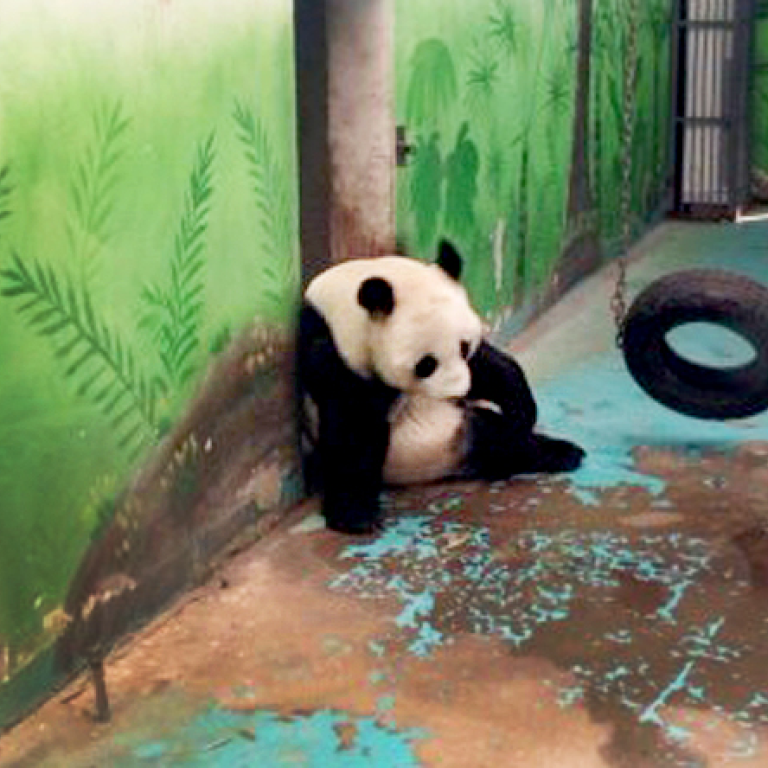
Update | ‘Cover-up’ of Henan panda's death casts suspicion on zoo
Staff member admits zoo official lied that animal was 'sent back to Sichuan base', because they lacked information and were shocked by death at the time
A Henan zoo’s contradictory explanations on why a panda it borrowed had gone missing from its pen – and which later turned out to have fallen fatally ill – has raised questions about the real circumstances of its death.
Jin Yi, a panda aged six and a half, had died on February 9 of stomach bleeding, the Zhengzhou Zoo in Henan province announced on its official microblog account on Thursday.
But the zoo had claimed on Monday – a day after its supposed death – that the panda was returned to its parent base. Asked if the animal had died because it was not seen at its cage for days, Li Chaojun, a section head of the zoo, told newspaper on February 10 that it was sent back to the Wolong Nature Reserve in Sichuan province for breeding.
We are also shocked and deeply saddened by its sudden death, and had not yet found out why it died when the reporter called us
The animal, the other half of a pair of pandas Zhengzhou got on loan in May 2011, disappeared from public view as early as last Sunday.
An employee at the zoo, surnamed Xu, admitted to the that Li had lied about the incident because staff could not explain the cause of death at the time.
“We are also shocked and deeply saddened by its sudden death, and had not yet found out why it died when the reporter called us,” Xu said.
A staff member from the WWF-backed China Conservation and Research Centre for the Giant Panda, surnamed Han, confirmed to the Post that the panda's remains were cremated, noting that the cremation took place after they took samples for testing.
The research centre manages the Wolong preserve.
“We have already sent the samples to a veterinary institute in northern China for further death testing to find out the reasons behind the stomach bleeding," Han said.
The final forensic report will be released in two weeks at the earliest, according to Xu.
Possible cause of death
Various media reports from Sichuan and Zhengzhou city said factors leading to Jin Yi’s death were heart failure, hemorrhaegic gastroenteritis and shock. A China.org.cn report also cited the zoo as saying the panda was infected by parvovirus, a contagious disease normally affecting dogs.
Li Caiwu, a veterinarian sent by the Giant Panda research centre to the Zhengzhou Zoo, said they had not yet found the cause of infection for Jin Yi.
Li said he would be monitoring Jin Yi's neighbour in the panda facility, 13-year-old Long Sheng, even though the animal has not shown any signs of infection as yet. The research centre has not ruled out the possibility of contagion, Li added.
“It is also why I will stay in Zhengzhou for another few weeks to keep a close eye on Long Sheng,” Li said.
The vetereniarian noted that panda deaths at zoos were uncommon.
Zookeeper Xiong Liangbo, Jin Yi’s caretaker since July last year, told Dahe Daily that the panda lost 20kg of weight in the seven months before it died.
Jin Yi was 90kg when Xiong was appointed to take care of it, but only 70kg before it died, Xiong told the paper.
Li said chronic gastrointestinal disease could lead to such weight loss.
Speculation of abuse
Citing a history of dirty cages and poor diet, however, social media users speculated that the panda died from abuse.
A microblogger named Warm-Mei said in a post that the panda was forced to take pictures with visitors at the height of summer and would be whipped if it failed to comply, reported on Thursday.
The zoo only fed Jin Yi steamed corn bread during the winter to skimp on more expensive bamboo, the report quoted another microblogger named Panda Ying Ying as writing, with accompanying screenshots of those posts.

According to the global conservation body WWF, pandas subsist almost entirely on bamboo, and must eat 12kg to 38kg of it every day.
But Han said feeding pandas with "specialised" corn bread was in fact a common practice even at the reserve.
"Though it is called the 'steamed corn bread' by the keepers, it is not the same bread that we eat, but a panda food especially designed by the veterinarian and the nutritionist. It contains all the nutrition, especially food fiber, that a panda needs for a day."
In 2011, a post on Shangdu Forum titled “Is panda in the Zhengzhou Zoo a national treasure or banknote printer?” pointed out similar misconduct, showing pictures of a keeper making the panda pose with paying visitors.
“We don’t allow visitors to touch or stay too close to the pandas, and don’t encourage visitors to take pictures with them. But there’s no regulation banning it,” Han said.
The giant panda is listed as endangered animal by the WWF, with fewer than 1,600 left in the wild.
